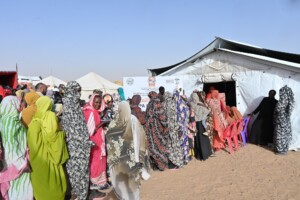‘Conflict, sanctions, press Sudanese currency rates’: economist
A continuation of both the armed conflicts in Sudan and the economic sanctions against the country will push the black market US Dollar rate to 20 Sudanese Pounds, according to a prominent Sudanese economist.
A continuation of both the armed conflicts in Sudan and the economic sanctions against the country will push the black market US Dollar rate to 20 Sudanese Pounds, according to a prominent Sudanese economist.
“All current efforts by Sudanese government officials in New York and other places have one single aim: lifting the economic sanctions imposed on the country, to prevent a further rise of the US Dollar against the Pound”, according to Prof Hamid Eltigani, economist and head of the Department of Public Policy and Administration at the American University in Cairo.
He pointed out that the condition placed by the USA for the lifting of its economic sanctions against Sudan is the ending of the civil wars by a comprehensive peace agreement.
“Apart from this, the Dollar rate will never be brought down unless the production in Sudan rises again. Once a peace agreement has been reached and the wars are stopped, the people in Darfur, South Kordofan and the Blue Nile will significantly contribute to a rise in production levels,” he added.
Network
Eltigani further explained that “all the banks in the world have stopped dealing with their Sudanese counterparts since 2014 because of the sanctions.
“In an attempt to get around this, the Bank of Sudan established a network of more than 1,000 banks to deal with them indirectly. When the Americans discovered this, they warned the banks involved. A number of those banks had to pay substantial fines.”
He described the current economic situation as disastrous. “The Sudanese economy has been marginalised. More than 15 million Sudanese are living under the poverty line, which means half of the population. And the number is growing.”
On Monday, the Dollar rate against the Sudanese pound exceeded SDG10.10 on the black market in in Khartoum. Currency traders attribute the increase to the scarcity of hard currency traded at the stock market.
A black market trader told Radio Dabanga from Khartoum that they expect another rise of the dollar price “within the coming days.
“This will lead to the suspension of more import goods,” he predicted.
Late July, the Saiga Company, one of the largest flour suppliers in Sudan, shut down its mills after a dispute with the government about the dollar rate set for wheat imports. The much higher US dollar rate on the black market was causing major losses to the flour mills.
The Seen Flour Mills, owned by the Sudanese security apparatus, has become the sole provider of flour to the bakeries in Khartoum.
Sanctions
Sudan has been on the US list of ‘state sponsors of terrorism’ since 1993. Washington has imposed economic sanctions on the country since 1996.
According to experts, the scarcity of hard currency in Sudan as a result of the US economic sanctions has significantly contributed to the rise in the black market exchange rate. In September 2010, the Central Bank of Sudan announced that the lack of hard currency was becoming acute.
The situation worsened after South Sudan seceded in July 2011, by which Sudan lost two-thirds of its oil revenues to the South.
In April 1996, President Bill Clinton signed the Anti-Terrorism and Effective Death Penalty Act, which banned Americans from engaging in any financial transactions with governments on the US list of terrorism sponsors, including Sudan. More than a year later, in November 1997, Washington imposed broad sanctions against Sudan by executive order. The action blocked all Sudanese government assets in the USA and barred all trade as well as a wide range of financial transactions with Sudan.
The US adjusted its policy in April 1999 and exempted the exports of agricultural goods, medicine and medical equipment from the unilateral sanctions. No US financing would be allowed for the sales, but Sudan would be able to buy US food.
President Bush signed the Darfur Peace and Accountability Act on 13 October 2006, which calls on the president to block the property of, and prohibits transactions with designated individuals and entities associated with Sudan’s government.
In October 2009, President Obama unveiled a new comprehensive policy towards Sudan that encompasses possibly lifting sanctions and removing the country from the State Department’s state sponsor of terrorism list. The policy’s three priorities are: implementing the Comprehensive Peace Agreement signed in 2005, ending the conflict in Darfur, and ensuring that Sudan does not become a safe haven for international terrorists. The policy also specifies that relations will not be normalised unless progress is made on all the issues.
Certain restrictions on licensing regulations in the agricultural sector and restrictions on spare parts for trains were removed in September 2010.
This year the USA began to ease the sanctions on some technologies exported to Sudan. In February the US Office of Foreign Asset Control (OFAC) announced that it amended Sudan’s sanctions regime to allow exports of personal communications hardware and software including smart phones and laptops. Google announced on 17 July that it has expanded access to free applications on Google Play to users in Sudan for the first time.











 and then
and then